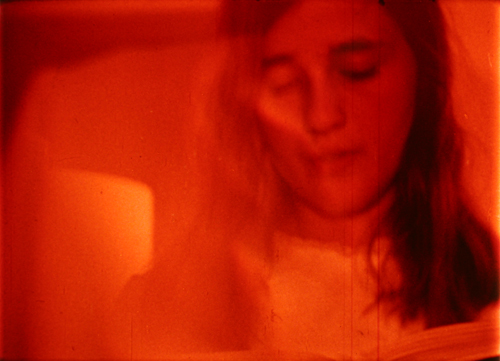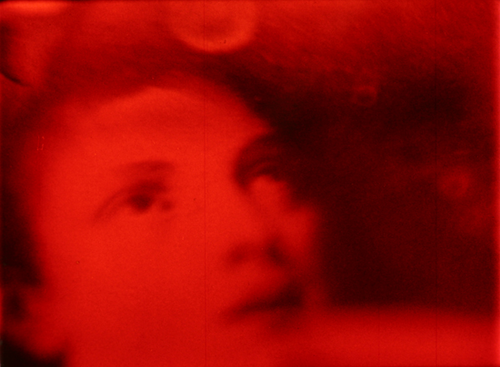6.12.10
Quick Billy DVD/Ronald Johnson's Modernist Collage Poetry
11:28 PM
Another day, another reason to get excited for the holidays, as two more essential items have arrived:
(Quick Billy by Bruce Baillie; courtesy Anthology Archives)
First, the long awaited release of Bruce Baillie's 1971 Masterpiece with a capital M (the first five minutes will make your head spin) Quick Billy. This third release is available through Canyon Cinema , $50 for home use and $300 for institutional use. An immense amount of sacrifice and effort went into the creation of this DVD, so sincere gratitude is owed to many (especially Baillie himself and John Carlson, who aided with the transfer and color coding). The beauty of the film is difficult to put into words, but as Bruce Elder says of the film:
"One masterwork in the cinema that depicts the process by which its maker attempts to recover the true self -- or, if not the true self, an authentic self that enters into uncorrupting relations with the world beyond it -- is Bruce Baillie's 'Quick Billy (1970). Here an attack on the body, a bout with yellow fever, brings Baillie to confront his mortality. This confrontation brings him to revise his understanding of himself, his family, his personal history, and his goals. 'Quick Billy' tells the tale of his falling ill, of his becoming delirious and delusional and experiencing memories of his former self, of his transformation, and of his rebirth as authentic individual. While Baillie patter the film on the 'Bardo Thodol (The Tibetan Book of the Dead)', the matrix from which 'Quick Billy' arises is really Gnosticism. Like the similarly Gnostic/Eleusian 'Cantos' of Ezra Pound, 'Quick Billy' is a tale of going into the underworld, experiencing terror, undergoing transformation, and being reborn. The agency that brings on the transformation in both cases is the experience of light."
- (Bruce Elder in 'A Body of Vision')
(Quick Billy by Bruce Baillie; courtesy Anthology Archives)
---
By now anyone who has followed this blog should know that the importance of Ronald Johnson's poetry in my life is and has been immeasurable, so the upcoming in-depth survey of his work (more or less the first of its kind aside from the wonderful Ronald Johnson: Life and Works) Ronald Johnson's Modernist Collage Poetry by Ross Hair is not to be missed. I've yet to get my hands on a copy as it will not be released until the 21st, but when a groundbreaking work like this comes along there is no doubt that it demands consideration. The description is as follows:
Ronald Johnson’s Modernist Collage Poetry is the first monograph to address the legacy of the American poet, Ronald Johnson (1935-1998). Drawing upon never before seen archival material, this book sets out to understand Johnson’s poetry in the context of the “New American” collage tradition, stretching from Ezra Pound to Louis Zukofsky and beyond. Additionally, Ross Hair assesses Johnson’s work in relation to wider questions concerning literary chronologies, especially the discontinuities commonly seen to exist between nineteenth-century Romantic and twentieth-century modernist literary forms.
So far the reviews have been understandably effusive:
"Whitman’s famous injunction--'To have great poets, there must be great audiences'--can usefully be modified to say, 'Great poets require a great reader.' In this groundbreaking new book, Ross Hair proves himself to be the great reader Ronald Johnson’s work has needed: someone to connect and synthesize the different traditions Johnson availed in creating his powerful poetry – from the Transcendentalists, to Pound and the Modernists, to concrete and visual poetries from mid-century – all the while alerting us to the central creative principle that drives Johnson’s work. Namely, a recovery of an Edenic innocence enabled by unironic acts of assemblage and vision, where beauty and pleasure are the desired goals. Johnson was one of our finest visionary poets; Hair’s illumination of Johnson’s ‘ocularcentric concerns’ shows us why, especially in the ways 'ocular' is transformed into 'oracular' in Johnson’s generative poetics. Hair’s sense of Johnson’s work is as keen as it is profound; his readings of Johnson’s work – especially of Johnson’s major long works, including his masterpiece ARK – are invaluable for seasoned and uninitiated readers alike. Ronald Johnson’s Modernist Collage Poetry will take its place as the Thoreauvian cornerstone for all subsequent understandings of Johnson’s poetry."--Peter O’Leary, executor for the literary estate of Ronald Johnson, author of Gilding the Buddha: My Apprenticeship with Ronald Johnson
"In Ronald Johnson’s Modernist Collage Poetry, the first book-length study of Johnson’s work, Ross Hair ably demonstrates that Johnson’s poetry 'proposes innocence as an epistemological condition, denoting a way of experiencing and responding to the world of events without prescription.' A visionary bricoleur and direct heir of the American Transcendentalists, Johnson brilliantly appropriated and revised the revolutionary principles of his modernist precursors (Pound, Williams, Moore, Zukofsky, Olson…), producing one generous vernacular masterpiece after another. Exploring archival materials, analyzing intertextual relations, and closely reading Radi os, The Book of the Green Man, and most importantly, ARK, Hair shows both new readers and those familiar with the work why Johnson is one of the most important poets of the second half of the twentieth century: an invaluable contribution to our understanding of contemporary American poetry."--Norman Finkelstein, Professor of English, Xavier University and author of On Mount Vision: Forms of the Sacred In Contemporary American Poetry
"'The test of poetry,' Louis Zukofsky once wrote, 'is the range of pleasure it affords as sight, sound, and intellection.' Page after page, Ronald Johnson’s poetry passes that test with flying colors, and Ross Hair’s new study shows how. Exploring the poet’s relationships with Transcendentalism, the modernism of Pound, Olson, Zukofsky, and Moore, and with his poetic contemporaries, from Guy Davenport and the Language Poets to British authors Thomas A. Clark and Geoffrey Grigson, this book invites us to rethink the story of American poetry since the 1960s, putting Johnson and his collage poetics center stage. Hair’s sharp eye and attentive ear serve him well in deft close readings and in fresh archival discoveries (Harold Bloom was a fan? Who knew?), and he gives an illuminating, poignant account of the poet’s occlusion in the 1980s and ‘90s, as critical fashion passed him by. That time in shadow has passed, this groundbreaking book suggests. I am glad and grateful to see it."--Eric Murphy Selinger, co-editor of Ronald Johnson: Life and Works
"In Ronald Johnson’s Modernist Collage Poetry, the first book-length study of Johnson’s work, Ross Hair ably demonstrates that Johnson’s poetry 'proposes innocence as an epistemological condition, denoting a way of experiencing and responding to the world of events without prescription.' A visionary bricoleur and direct heir of the American Transcendentalists, Johnson brilliantly appropriated and revised the revolutionary principles of his modernist precursors (Pound, Williams, Moore, Zukofsky, Olson…), producing one generous vernacular masterpiece after another. Exploring archival materials, analyzing intertextual relations, and closely reading Radi os, The Book of the Green Man, and most importantly, ARK, Hair shows both new readers and those familiar with the work why Johnson is one of the most important poets of the second half of the twentieth century: an invaluable contribution to our understanding of contemporary American poetry."--Norman Finkelstein, Professor of English, Xavier University and author of On Mount Vision: Forms of the Sacred In Contemporary American Poetry
"'The test of poetry,' Louis Zukofsky once wrote, 'is the range of pleasure it affords as sight, sound, and intellection.' Page after page, Ronald Johnson’s poetry passes that test with flying colors, and Ross Hair’s new study shows how. Exploring the poet’s relationships with Transcendentalism, the modernism of Pound, Olson, Zukofsky, and Moore, and with his poetic contemporaries, from Guy Davenport and the Language Poets to British authors Thomas A. Clark and Geoffrey Grigson, this book invites us to rethink the story of American poetry since the 1960s, putting Johnson and his collage poetics center stage. Hair’s sharp eye and attentive ear serve him well in deft close readings and in fresh archival discoveries (Harold Bloom was a fan? Who knew?), and he gives an illuminating, poignant account of the poet’s occlusion in the 1980s and ‘90s, as critical fashion passed him by. That time in shadow has passed, this groundbreaking book suggests. I am glad and grateful to see it."--Eric Murphy Selinger, co-editor of Ronald Johnson: Life and Works
---
The light that has lately graced these brisk Winter mornings certainly just got a little bit brighter...
Labels:
Bruce Baillie,
Canyon Cinema,
John Carlson,
Quick Billy,
Ronald Johnson,
Ronald Johnson's Modernist Collage Poetry
Subscribe to:
Post Comments (Atom)



0 comments:
Post a Comment